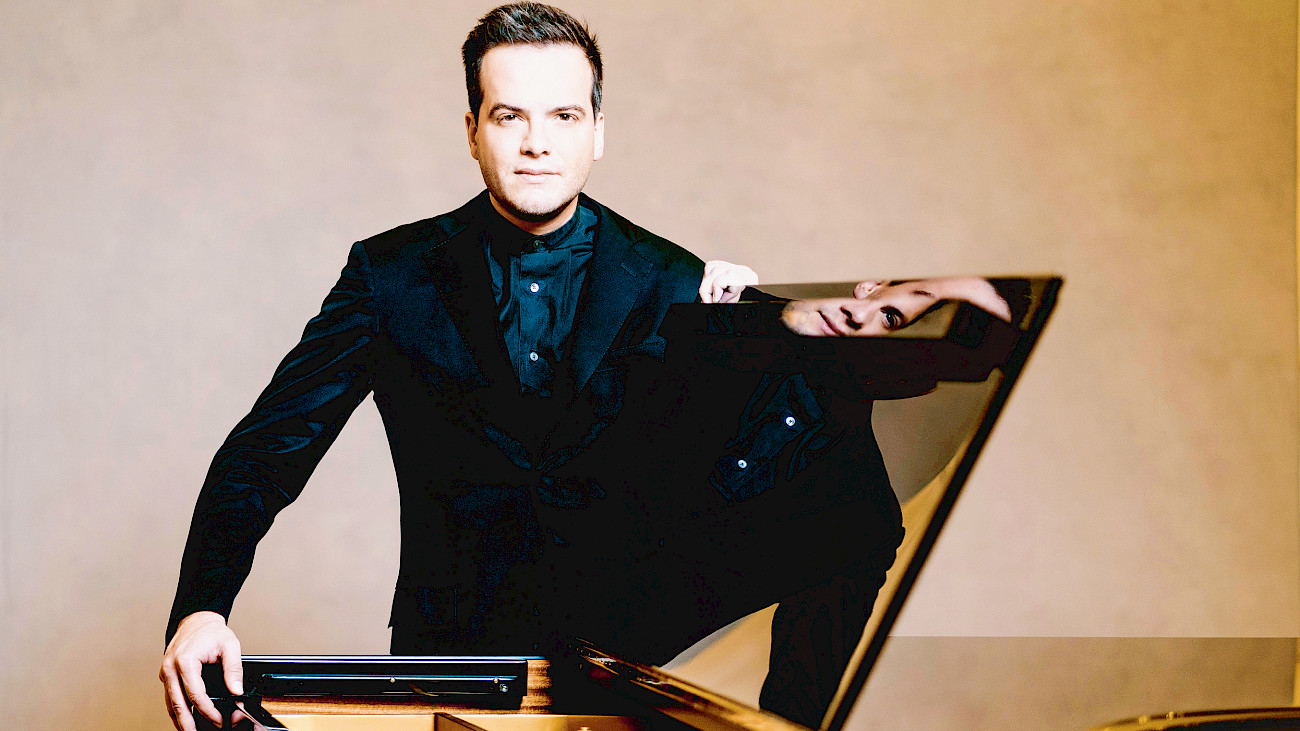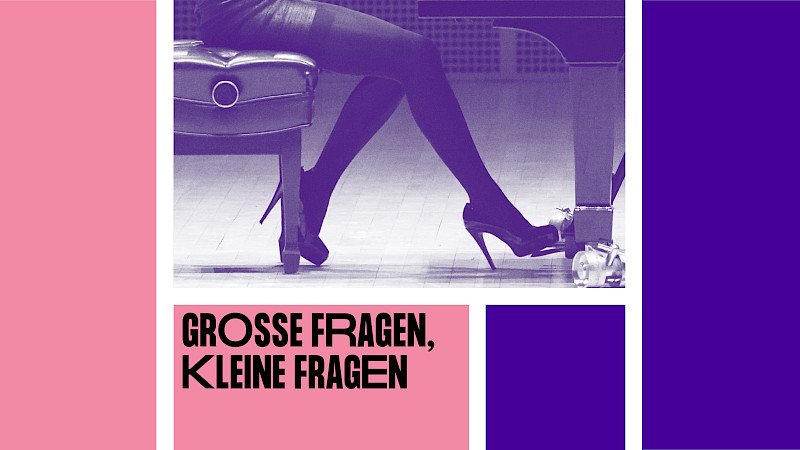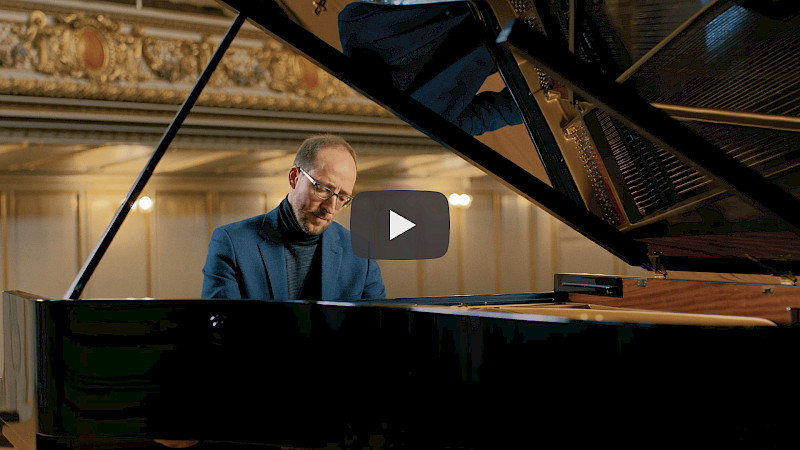
«The Story Has To Be Right»
The Ticino pianist Francesco Piemontesi is at the centre of the Rachmaninoff cycle that the Zurich Opera House and Tonhalle-Orchester Zürich are jointly staging.
The Zoom call is scheduled for 10 o'clock, and at 10 o'clock and three seconds Francesco Piemontesi appears on the screen. It's not his way to behave like a star. The pianist from Ticino, born in 1983, has actually never did so.
Perhaps that is why he is currently one of the most exciting interpreters of Rachmaninoff's works. He doesn't play them as show numbers, he has never taken part in the competition to play faster and louder. Even if he does go to extremes in between, he is interested in the nuances, the lively, nuanced musical narrative. That he once made his name with Mozart, Schumann and Debussy is undoubtedly no coincidence.
Francesco Piemontesi, since when have you been interested in Rachmaninoff?
He was present from the beginning, thanks to the records we had at home. There was the Piano Concerto No. 4 with Arturo Benedetti Michelangeli, who incidentally lived in Ticino at the time. That was my first encounter with Rachmaninoff's music. Later, our very first CD was the complete recording of his works for piano and orchestra with the American pianist Abbey Simon; for me, that is still one of the best recordings.
You recently visited the Villa Senar on Lake Lucerne, which Rachmaninoff had built for himself in 1933. How did you experience this place?
It is magical. From Rachmaninoff's grand piano you can see the lake, and in the room there is also his library with scores that he studied and partly annotated. Schubert songs, works by Beethoven ... The interesting thing is that at first glance the house doesn't seem to fit his music. His architectural taste was far more modern than his musical taste.
Rachmaninoff had his Steinway grand piano specially made. What kind of instrument is it?
The sound is very warm, rather soft, and the notes resonate for an incredibly long time. Modern grand pianos are often designed in such a way that the stroke triggers an explosion, so to speak, and the sound dies away relatively quickly afterwards. Instruments like Rachmaninoff's may have less power for our ears, but when it comes to legato or imitating string voices, they are ideal.
"It's revealing to hear Rachmaninoff play entirely without romantic exuberance. You can tell he trusts his works; he knows they work, that he doesn't need to do anything extra."
What does this piano reveal about Rachmaninoff's understanding of music?
His works are often played very fast, hard and brilliantly today. Speed was certainly an issue for him, you can hear that in his recordings. But I wonder whether the tempo was occasionally chosen so high that the recording would fit on one side of a long-playing record. Especially in the shorter works, you can hear the elegance in his playing, the calmness, the dignity. Show effects seem to have been alien to him. It's like Maria Callas: after two notes, the atmosphere is there, the character, the emotional state.
Are these recordings important for you? Or is it just the notes?
The notes are more important. I am confronted with different instruments than he is, it is a different time, I come from a different cultural area; all that shapes my interpretation. And we don't know under what circumstances the recordings were made at the time. In the 3rd Piano Concerto, for example, Rachmaninoff made several cuts that make no sense from today's perspective. They probably only had to do with the limited time of a long-playing record; in the concert, he performed the work in its entirety. In any case, it is revealing to hear that he played without any romantic exuberance - here we are also musically in the modern era. One notices that he trusts his works; he knows that they work, that he doesn't need to do anything extra.
—
Francesco Piemontesi also does "nothing extra" when he performs. While others stage themselves with brand names or spectacular photos, he focuses entirely on the music. His career does not take place in the media, not even (or only very discreetly) on Instagram, but in the concert halls. That's probably why it took some time for it to really get going.
A second reason is Piemontesi's passport. "To be successful as a Swiss, you first have to leave," he says, and he likes to tell the story of the great Russian pianist Tartarov, who was celebrated in the sold-out Tonhalle Zürich in 1968 - and outed himself as Jean-Jacques Hauser at the end of the concert. That foreign talents have it easier in this country than our own was impressively proven by this joke.
All the same, Piemontesi has meanwhile arrived not only in the international concert halls but also in his homeland, even without a pseudonym - and is now at the centre of a very special project in November. When Paavo Järvi and Gianandrea Noseda swap desks and orchestras in the joint Rachmaninoff cycle, he is the soloist in both houses. With the "Rhapsody on a Theme of Paganini" and the 4th Piano Concerto, he presents two very different works. A few days later, he follows it up with a recital of Rachmaninov's Sonata No. 2.
—
Why is the 4th Piano Concerto so much less well-known than other Rachmaninoff works?
One reason is probably the ending: the last thirty seconds of a work are crucial to its success. Think of Bartók's Piano Concerto No. 3, it's one of the best concertos ever written, but the last bars are a bit bland; you're almost perplexed when it ends. Rachmaninov's Piano Concerto No. 4 has a similar problem. The first three concertos or even the "Rhapsody" close much more spectacularly. And then this 4th concerto is much more sombre than the others, and the fragmented melodies don't lend themselves to being catchy tunes.
But you still like to play it?
I actually love this concerto in particular, perhaps because of the childhood memories with Michelangeli. And I am happy that I can play it in the Tonhalle Zürich under the baton of Gianandrea Noseda: It needs a conductor like him for this work. It's more complicated than others; Rachmaninov's Piano Concerto No. 2, for example, is written entirely for practice, so you're almost automatically together. The Fourth needs more rehearsal, it's much more difficult. There are not many who can - and want to - conduct this work.
You have known both Gianandrea Noseda and Paavo Järvi for a long time. How is the collaboration with both of them?
I have been friends with Gianandrea for years; he lives partly on Lake Maggiore, like my parents. We regularly try to realise joint projects. He is a great seeker - he is always looking for the meaning of a place, for a way to make something even better. With Paavo, the first thing that comes to mind is communication with the eyes. He is a great musician and - in the best sense - technician. He gives a lot of freedom to a soloist and also to himself, because he knows that he has everything under control. And he is so relaxed about it, one glance is enough to anticipate something or to steer it in another direction. With him, you really make chamber music.
—
Keyword chamber music: for Piemontesi, this continues to a certain extent off the podium as well. He is not a lone fighter, the exchange with colleagues means a lot to him. That is also why he likes living in Berlin, the scene is colourful, people meet regularly or by chance, talk about works or difficult passages, help each other out. "If someone wants to play one of my Mozart cadenzas, I send it over," says Piemontesi.
Since 2013, he has also been at the centre of a network as artistic director of the traditional Settimane Musicali di Ascona - and uses the position not least to strengthen the Swiss scene and make it visible. The Ticino audience should hear that long flight paths are not a criterion for quality. So every year, in addition to international musicians, he invites local orchestras and ensembles; in September it was the turn of the Tonhalle-Orchester Zürich and the Basel baroque ensemble La Cetra.
All these contacts are important for him, as a balance. Because as a pianist, as Piemontesi puts it, "you are not alone, but you are on your own".
—
How do you feel when you step on stage for a Rachmaninoff work? So many notes, so many expectations ...
The crucial thing is not to think that something could go wrong. Because then something will definitely happen. I go on stage with the attitude that I am here to convey something that is really important. I know that this music is valuable, that it can give something to the audience and to my colleagues. If a mistake happens, that's not so bad; we are not machines. It's only in communication that you can't make mistakes. The story you tell in a performance: It has to be right.
So you're not nervous?
I am nervous, because every concert is different; you never know how it will be. But when you sit on stage with a hundred other people and the conductor gives the cue, when you create a huge wave of sound together, an atmosphere - it's an incredible experience. That's something that doesn't exist in everyday life, and I'm still amazed in every concert at what happens. At that moment, it is the most beautiful and intense thing in life.





